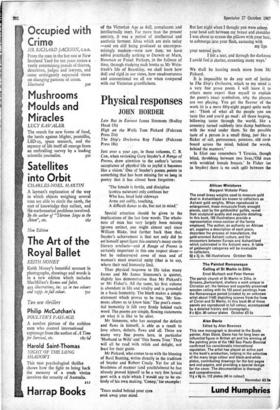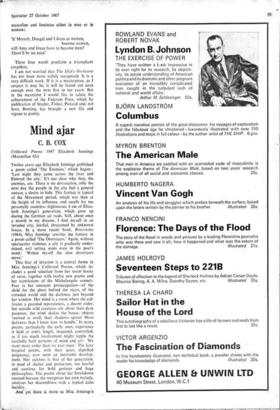Physical responses
JOHN HORDER
High on the Walls Tom Pickard (Fulcrum Press 21s) The Ship's Orchestra Roy Fisher (Fulcrum Press 18s) Just over a year ago, in these columns, C. B. Cox, when reviewing Gary Snyder's A Range of Poems, drew attention to the author's 'serene acceptance of physkal life so joyful it becomes like a vision.' One of Snyder's poems points to something that has been missing for so long in poetry that it has almost been forgotten:
'The female is fertile, and discipline (contra naturam) only confuses her Who has, head held sideways Arms out softly, touching, A difficult dance to do, but not in mind.'
Special attention should be given to the implications of the last four words. The whole- ness of man has very largely been missing (grown extinct, one might almost say) since William Blake, and further back than that. Snyder's achievement is that not only did he set himself apart from this century's many sterile literary artefacts—and A Range of Poems is certainly important in this one respect alone— but he rediscovered some of man and of woman's most essential unity (that is to say, where their real humanity lies).
Thus physical response to life takes many forms and Mr James Simmons's is quieter, slightly less demonstrative than Mr Pickard's or Mr Fisher's. All the same, his first volume is abundant in life and vitality and is grounded in a basic humanity. The blurb makes a simple statement which proves to be true, 'Mr Sim- mons allows us to know him.' The poet's essen- tial humanity is felt very firmly behind each word. The poems are simple, flowing statements on what it is like to be alive. Mr Simmons, who has accepted the defects and flaws in himself, is able as a result to love others, defects, flaws and all. There are many very fine poems here, in particular 'Husband to Wife' and 'This Seems True.' They will all be read with relish and delight, not least for their gusto.
Mr Pickard, who comes to us with the blessing of Basil Bunting, writes directly in the tradition of Snyder and Robert Crecly. Yet for all his brashness of manner (and youthfulness) he has already proved himself to be a very fine lyrical poet with a style which I would say to be en- tirely of his own making. 'Conny,' for example: 'Tears sealed behind your eyes soak away your mind. But last night when I thought you were asleep, your head soft between my breast and shoulder I was about to stream the pillows with your hair, to submerge into your flesh, caressing with my lips your sensual parts I felt a tear, and through the darkness I could feel it shatter, streaming many ways.'
We shall be hearing much more from Mr Pickard.
It is impossible to do any sort of justice to The Ship's Orchestra, which to my mind is a very fine prose poem. I will leave it to others more expert than myself to explain the poem's exact symbolism, why the players are not playing. You get the flavour of the work (it is a mere fifty-eight pages) quite early on : 'Think of what all the people you sea taste like and you'd go mad : all those leaping, billowing tastes through the world, like a cemetery turned suddenly into damp bedsheets with the wind under them. So the possible taste of a person is a small thing, just like a flicker of salt, putrescence, potatoes, old card- board across the mind, behind the words, behind the manners.'
In Eliot one remembers 'I Tiresias, though blind, throbbing between two lives,/ Old man with wrinkled female breasts.' In Fisher (as in Snyder) there is no such split between the
masculine and feminine either in man or in woman: 'If Merrett, Dougal and I dress as women, become women, will Amy and Joyce have to become men? There'll be no need.'
These four words proclaim a triumphant I am not worried that The Ship's Orchestra has not been more widely recognised. It is a very difficult work. If it is a masterpiece, as I suspect it may be, it will be found out soon enough over the next five to ten years. But in the meantime I would like to salute the achievement of the Fulcrum Press, which by publication of Snyder, Fisher, Pickard and, not least, Bunting, has brought a new life and vigour to poetry.











































 Previous page
Previous page